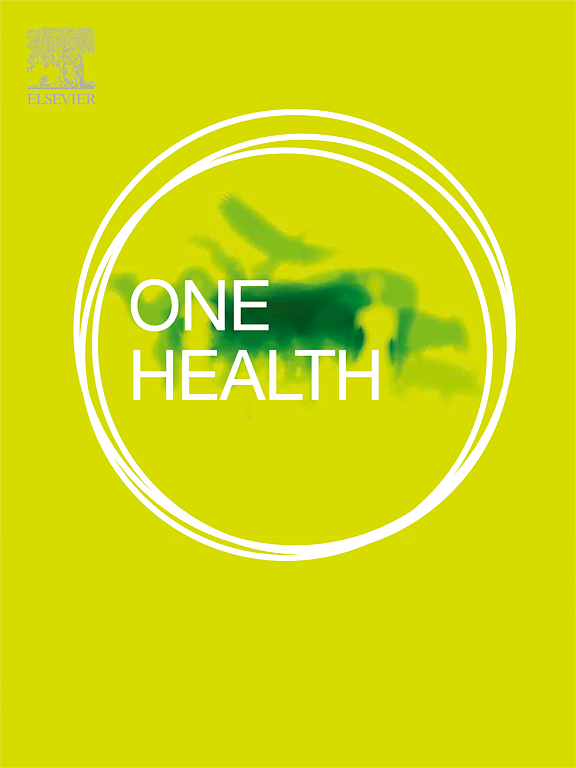厄瓜多尔自由放养犬布鲁氏菌属和烧伤柯西氏菌血清阳性反应及风险因素初探
IF 4.1
2区 医学
Q1 INFECTIOUS DISEASES
引用次数: 0
摘要
布鲁氏菌病和 Q 热是分别由布鲁氏菌属和烧伤柯西氏菌引起的两种细菌性人畜共患病。狗是这些病原体的贮藏地,在其传播过程中扮演着重要角色。在这项研究中,我们测定了厄瓜多尔自由遛狗的布鲁氏菌属和烧伤克氏菌抗体的血清流行率,并根据地理变量进行了统计分析。在2018年11月至2019年5月期间,从397只自由遛狗的狗身上采集了血清样本,并用商业ELISA检测法对布鲁氏杆菌属和Q热进行了分析。发现布鲁氏菌属和烧伤弧菌的总体血清流行率分别为 2.8 %(CI:95 %,0.0-6.2 %)和 1.8 %(CI:95 %,0.0-5.6 %)。除了布鲁氏菌感染与沿海地区有关外,厄瓜多尔不同地理区域之间、农村与城市之间的血清流行值没有统计学差异。这是厄瓜多尔首次开展此类研究,并指出有必要采取 "统一健康 "方法来控制和监测布鲁氏菌病和 Q 热等人畜共患疾病,包括将野狗和流浪狗作为向牛、人或野生动物传播这些病原体的 "蓄水池"。本文章由计算机程序翻译,如有差异,请以英文原文为准。
A first insight into seropositivity and risk factors for Brucella spp. and Coxiella burnetii in free-roaming dogs in Ecuador
Brucellosis and Q fever are two bacterial zoonoses caused by Brucella spp. and Coxiella burnetii, respectively. Dogs are reservoirs of these pathogens and play an important role in their spread. In this research, we determined the seroprevalence of antibodies against Brucella spp. and C. burnetii in free-roaming dogs from Ecuador and conducted a statistical analysis based on geographical variables. Serum samples were collected from 397 free-roaming dogs between November 2018 and May 2019 and analyzed with commercial ELISA tests for Brucella spp. and Q fever. An overall seroprevalence of 2.8 % (CI: 95 %, 0.0–6.2 %) and 1.8 % (CI: 95 %, 0.0–5.6 %) was found for Brucella spp. and C. burnetii, respectively. No statistical differences in seroprevalence values were found between geographical regions in Ecuador or between dogs from rural or urban settings, except for the association of C. burnetii infection with the Coastal Region. This is the first study of this kind in Ecuador and points out the need for a One Health approach for control and surveillance of zoonotic diseases like brucellosis and Q fever including feral and stray dogs as reservoirs to spread those pathogens to cattle, humans, or wildlife.
求助全文
通过发布文献求助,成功后即可免费获取论文全文。
去求助
来源期刊

One Health
Medicine-Infectious Diseases
CiteScore
8.10
自引率
4.00%
发文量
95
审稿时长
18 weeks
期刊介绍:
One Health - a Gold Open Access journal.
The mission of One Health is to provide a platform for rapid communication of high quality scientific knowledge on inter- and intra-species pathogen transmission, bringing together leading experts in virology, bacteriology, parasitology, mycology, vectors and vector-borne diseases, tropical health, veterinary sciences, pathology, immunology, food safety, mathematical modelling, epidemiology, public health research and emergency preparedness. As a Gold Open Access journal, a fee is payable on acceptance of the paper. Please see the Guide for Authors for more information.
Submissions to the following categories are welcome:
Virology,
Bacteriology,
Parasitology,
Mycology,
Vectors and vector-borne diseases,
Co-infections and co-morbidities,
Disease spatial surveillance,
Modelling,
Tropical Health,
Discovery,
Ecosystem Health,
Public Health.
 求助内容:
求助内容: 应助结果提醒方式:
应助结果提醒方式:


